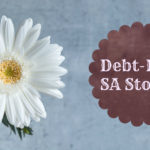If you’ve been following our Journey to Becoming Credit Card Debt-Free, you’ll know that we’re huge fans of Dave Ramsey and the advice he has to offer. We have been following his 7 Baby Steps to becoming credit card debt-free which has worked for us, although by no means was it a quick and easy way out of credit card debt! It was anything but that! I’m sure that everyone who has been in a similar situation will pretty much tell you the same thing.
Your journey to becoming debt free will be a bit easier if you have a small, starter emergency fund in place before you begin paying down your debt, as Dave Ramsey suggests. His advice is that we should first save $1,000.00, which is the equivalent to about R13,500.00, and then start paying off your debts. This emergency fund will stop you from using your credit card to pay for unforeseen expenses, or emergencies, while you are paying down your debt. You can read Dave Ramsey’s Quick Guide to Your Emergency Fund.
Dave Ramsey also suggests that your emergency fund money should be kept someplace where you will be able to access it immediately, should you need it in an emergency, but it should not be so easily accessible, for example via a debit card, which might tempt you to spend it on a non-emergency such as a good sale! Dave Ramsey suggests using a high-yielding Money Market account.
Money Market accounts at banks are a type of account which give you a higher interest rate than ordinary savings accounts. While the interest rates are higher, they are usually not above inflation, but pretty much on par with the inflation rate. So while you may not be earning money, you are at least safeguarding it against inflation.
So in South Africa, what are some of your options, what are the costs involved and what are the pros and cons?
Standard Bank’s Money Market Call account requires a minimum deposit of R20,000.00 while FNB’s minimum deposit for the same type of account starts at R5,000.00 and Nedbank offers two options – one with an opening balance of R5,000.00 and another with an opening balance of R20,000.00.
In each case you would be required to maintain this opening balance in order to maintain an active account. This is something to think about in case you need to use up a chunk of cash from your starter emergency fund. Perhaps a smaller opening balance of R5,000.00 would be more easily accessible.
Bear in mind that the FNB Money Market account offers a small interest rate for amounts up to R19,999.00 (3.50%) which increases to 5.25% onwards for higher amounts. The Nedbank Money Market deposit account offers 5.50% on amounts up to R10,000.00, which is a useful comparison in this case. And a Capitec Savings account offers pretty competitive and similar rates, requiring no minimum deposit, but for a small monthly fee.
If you feel you would be more comfortable stashing your starter emergency fund in a savings account instead, then it would still be worth your while to shop around for the best terms and interest rates. Perhaps you can open a secondary account where you currently bank and which would incur no monthly fees but would allow you to transfer money as and when needed into your cheque account?
A savings account would definitely give you a much smaller interest rate but it would, at the same time, allow you to start saving from a smaller amount which might just be ideal for an emergency starter fund. Once you have the required amount saved it might then be a good idea to take advantage of the higher interest rates offered by Money Market accounts.
You might, at this stage, be wondering why I haven’t mentioned fixed deposits or unit trust investments as an option for stashing your emergency fund. I have come across quite a few blog posts online and opinions by personal finance gurus who suggest that the bulk of your emergency fund should be making you money and not simply catching up with inflation in a Money Market account. This, to me, kind of defeats the purpose of having an emergency fund. You either have it or you don’t, and as you would more than likely use that money in an emergency it should be a bit more easily accessible than a fixed deposit or a unit trust investment.
A fixed deposit might yield a slightly higher interest rate than a Money Market account, and you could still access your funds before maturity, you would need to give notice and there would be penalties involved in withdrawing your money before term. And while there wouldn’t be penalties involved in withdrawing money from your unit trust, you would still need to give at least 24 hours’ notice which may not be an ideal situation to face if you need to access your money in an absolute emergency (I always think of medical emergencies here, and over weekends or public holidays!).
Disclaimer: Please remember that I’m not a professional financial advisor and the opinions expressed in this blog post are purely my own. I simply share the little bit of knowledge I have in the hope that it might be useful to others. Please consult a professional financial advisor for more detailed advice suited to your specific circumstances.
If you’ve enjoyed this blog post, please share it with others!
You can also find Frugal in SA
on Facebook, Twitter and Instagram or subscribe to my Weekly Newsletter.











Yay! Finally people in SA are commenting on Dave Ramsey and looking for equivalent solutions here at home!
Thank you Aine! 😊
This is a very useful post. I am considering options w.r.t an emergency fund (I am currently in the process of paying off some debt)
Hi thanks for this post.you doing a good work on trying to make Dave Ramsey’s baby steps a rellevent South African version.im currentlly cruising on step 4&5 and it works.
Thanks Bheki! 😊 I absolutely agree with you it does work. Baby step 4 and 5 sounds awesome. Good luck to you as you move on up to baby step 6 and 7. 😊
The best place to save your emergency fund is in ur mortgage account. Accessible, higher rate and absolutely tax free